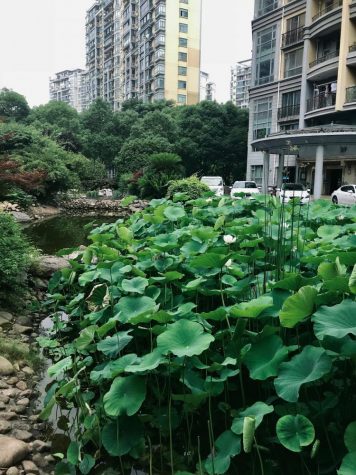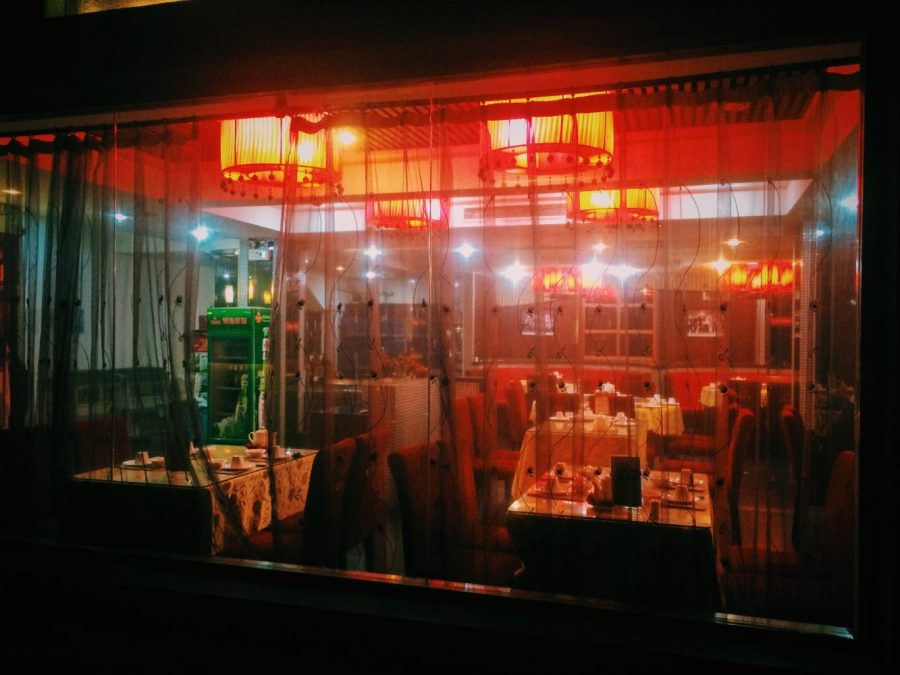In summers, you used to visit your Wai Po at her small condo in a complex of identical buildings interlaced with ponds. Most of the ponds were pale green and smattered with algae. Stones made footpaths through each one. When it was hot, you sat by each pool and watched the tadpoles swim through it. They looked like commas — sticky, glistening commas writhing under the sun.

You caught one in your bucket hat with Wai Po at your side. She stared at the plastic calisthenics gym to the right. You were nine and imagined her moving those sinewed arms under each yellow monkey bar. Flipping into the air. Full grace. Flipping into the sun.
At night, you sweated on the comforter with a fat carnation embroidered in the middle. The A/C was shot to shit. You felt feverish, but there was a light breeze shifting through a slat in the window. The breeze carried thick moonlight. Wai Gong’s books were everywhere. To this day, your grandfather is the only person close to you who has passed away.
Your grandmother would gasp in her sleep, her stomach inflating and deflating rapidly. She had nightmares about the half-forgotten things that littered the field of her memory. As a baby, her body was stained with red welts that drained themselves into pus her mother collected in bowls of bone china. When her village was occupied by men with hands that yearned to feel death, her family fled through a marshy wasteland, their necks submerged in water. The villagers hissed at the pale baby.
“Leave it here,” they said.
“By the looks of it, there isn’t much time left for her anyways.”
“She’ll only burden you.”
Her mother took one look at her. The tumors threatened to close over every inch of skin, gnawing at it voraciously with a black tongue. But there was still something pliable about her body, though it was ridged with sickness. Underneath the hardened flesh, there was something glowing. Her mother made a decision, packed up the little girl alongside the hard potatoes and currency, and strained her arms carrying everything over the black river for miles until they entered Shanghai.
“Two hundred and sixteen. There were two hundred and sixteen welts on my body, too many for it to conceivably hold. For two hundred and sixteen days, my mother popped each one with a needle, one every day until I was well again. I never got the chance to thank her for it. If she didn’t do that, I wouldn’t have existed long enough to meet your grandfather, and you wouldn’t have existed either.”
She pinched your cheek with her forefinger and thumb and chuckled, a deep belly laugh that reverberated through her throat.
You thought about the welts encompassing her skin, a country in mass turmoil. You thought about your grandfather’s death. Some part of you wondered: which pain was greater?
For weeks after he passed, she wailed down nine flights of stairs. In her apartment’s library, books knocked themselves off the shelves, paintings slid askew. The entire floor was littered with his pamphlets, books about aviation and slinky paperbacks from the school where he taught.
His voice would speak through her diaphragm at night; a low, unearthly timbre that told you to leave him alone. The door to her bedroom closed of its own accord.
You could hear her cries intermingling with the low moaning of the weeping willow trees outside her window. She was slowly exorcising herself with roots of paw-like plants and supplements.
At the funeral, you watched a long procession of Chinese men in black suits jumping over a pit of fire small enough to fill a bucket. Your mother leaned down and whispered to you, “They are entering a new realm by hopping over the fire. Just like grandpa.”
You grinned. You liked thinking about him that way. That night, when you sweated on the comforter, you dreamt of Wai Gong standing in a field, one of those meadows that was so flat there wasn’t a tree in sight. The air was smarmy and haloed with gnats.
In the center of the meadow, under the crescent moon, there was a blaze that blew orange all across Wai Gong’s face. He shuffled toward it in his plaid pajamas. The blaze got warmer and brighter.
Right before he stepped in, he turned to you, smiled, then turned back. You couldn’t bring yourself to look at all that char. Now, when you remember him, you remember his sleepy expression through half-moon lidded eyes. His fists clasped around a bouquet of carnations.
No char in sight. No fire.
Email Ashley Wu at [email protected]


























































































































































